间接引语变直接引语练习
- 格式:doc
- 大小:18.50 KB
- 文档页数:3
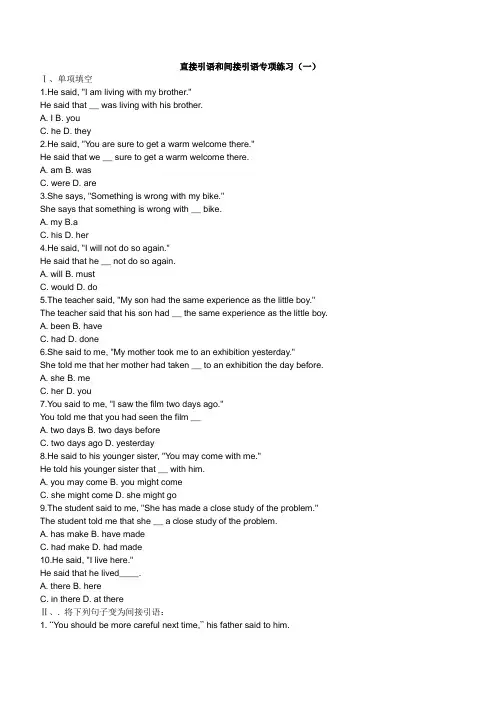
直接引语和间接引语专项练习(一)Ⅰ、单项填空1.He said, "I am living with my brother."He said that __ was living with his brother.A. IB. youC. heD. they2.He said, "You are sure to get a warm welcome there."He said that we __ sure to get a warm welcome there.A. amB. wasC. wereD. are3.She says, "Something is wrong with my bike."She says that something is wrong with __ bike.A. myB.aC. hisD. her4.He said, "I will not do so again."He said that he __ not do so again.A. willB. mustC. wouldD. do5.The teacher said, "My son had the same experience as the little boy." The teacher said that his son had __ the same experience as the little boy.A. beenB. haveC. hadD. done6.She said to me, "My mother took me to an exhibition yesterday."She told me that her mother had taken __ to an exhibition the day before.A. sheB. meC. herD. you7.You said to me, "I saw the film two days ago."You told me that you had seen the film __A. two daysB. two days beforeC. two days agoD. yesterday8.He said to his younger sister, "You may come with me."He told his younger sister that __ with him.A. you may comeB. you might comeC. she might comeD. she might go9.The student said to me, "She has made a close study of the problem." The student told me that she __ a close study of the problem.A. has makeB. have madeC. had makeD. had made10.He said, "I live here."He said that he lived____.A. thereB. hereC. in thereD. at thereⅡ、. 将下列句子变为间接引语:1. “You should be more careful next time,” his father said to him.2. Mr. Wang said, “I will leave for Shanghai on business next month, children.”3. “I haven’t heard from my parents these days,” said Mary.4. The geography teacher said to us, “The moon moves around the earth and the earth goes round the sun.”5. She said to him, “It’s time that you left here.”6. Zhang Hong said to me, “Doctor Wang passed away in 1948.”7. John said to his parents, “I had learned 500 Chinese words by the end of last term.”8. The history teacher said to them, “The Chinese Communist Party was founded on July 1st , 1921.”9. He said, “Are you a student?”10. “Have you anything interesting I can read, George?” she said.11. “She’s here to ask for help, isn’t she?” he asked.12. “Where are you going?” the father asked his son.13. “Are you sorry for what you have done?” the mother asked the naughty boy.14. She said, “Did you meet this man at the station two hours ago, Mr. Li?”15. “Write your names on your papers first,” the teacher said to us.16. “Please come here again tomorrow,” her friend said to her.17. “Let me pack the parcel for you,” he said.18. “Don’t make so much noise in class, boys and girls,” said the teacher.19. “What a lovely day it is!”20. “Happy New Year to you!” he said.III. 把下列句子变为直接引语:1. I told him that I had lost my money and that I would find it.2. She asked whether I would be free the next day or not.3. I asked her where she was going and what she was going to do the next day.4. His father told him not to climb that high tree in his new coat.5. The stranger asked me what my name was.6. The teacher asked if we could do it.最佳答案1C 2C 3D 4C 5C 6C 7B 8D 9D 10AII. 1. His father told him that he should be more careful the next time.2. Mr. Wang told the children that he would leave for Shanghai on business the next month.3. Mary said that she hadn’t heard from her parents those days.4. The geography teacher told us that the moon moves around the earth and the earth goes round the sun.5. She told him that it was time that he left there.6. Zhang Hong told me that Doctor Wang passed away in 1948.7. John told his parents that he had learned 500 Chinese words by the end of last term.8. The history teacher told them that the Chinese Communist Party was founded on July 1st, 1921.9. He asked whether I was a student.10. She asked George if he had anything interesting she could read.11. He asked whether she was there to ask for help or not.12. The father asked his son where he was going.13. The mother asked the naughty boy if he was sorry for what he had done.14. She asked Mr. Li whether he had met that man at the station two hours before.15. The teacher told us to write our names on our papers first.16. Her friend asked her to go there again the next/ following day.17. He offered to pack the parcel for me.18. The teacher told the boys and girls not to make so much noise in class.19. He/ She exclaimed that it was really a lovely day.20. He wished me a Happy New Year.III. 1. I said to him, “I have lost my money . I will find it.”2. She asked , “ You will be free tomorrow, won’t you?”3. I asked her, “Where are you going and what are you going to do tomorrow?”4. His father said, “Don’t climb this high tree in your new coat.”5. The stranger asked, “ What’s your name?”6. “I’ll finish my work tomorrow,” she said.7. The teacher asked, “Can you do it ?”8. The commander ordered his men, “Don’t cross the river before dawn.”9. My teacher asked, “Is he coming?”10. The scientist asked me, “What are you doing?”直接引语和间接引语专项练习(二)1. “You’ve already got well, haven’t you?” she asked.→She asked ________.A. if I have already got well, hadn’t youB. whether I had already got wellC. have I already got wellD. had I already got well.2. He asked , “ Are you a Party member or a League member?”→He asked me _________.A. am I a Party member or a League memberB. was I a Party member or a League memberC. if I was a Party member or a League memberD. whether was I a Party member or a League member.3. He asked, “How are you getting along?”→He asked _______.A. how am I getting alongB. how are you getting alongC. how I was getting alongD. how was I getting along4. He asked me ________ with me.A. what the matter isB. what the mater wasC. what’s the matterD. what was the matter5. He said, “Don’t do that again.” He _____ me _______ that again.A. said to me; not to doB. said to me; don’t doC. told me; don’t doD. told me; not to do6. Can you make sure ___________?A. that he will come here todayB. when he will come here todayC. will he come here todayD. whether will he come here today7. Do you happen to know ________?A. where is her addressB. in which place is her addressC. what her address isD. the place her address is8. Excuse me, but can you tell me ___________?A. where can I get to the libraryB. where I can get to the libraryC. how can I get to the libraryD. how I can get to the library9. John asked me _______ to visit his uncle’s farm with him.A. how would I likeB. if or not would I likeC. whether I would likeD. which I would like10. I’d like to know ________ Chinese.A. when he began to learnB. when did he begin to learnC. when did he begin learningD. for how long he began to learnII. 将下列句子变为间接引语:1. “You should be more careful next time,” his father said to him.2. Mr. Wang said, “I will leave for Shanghai on business next month, children”3. “I haven’t heard from my parents these days,” said Mary.4. The geography teacher said to us, “The moon moves around the earth and the earth goes round the sun.”5. She said to him, “It’s time that you left here.”6. Zhang Hong said to me, “Doctor Wang passed away in 1948.”7. John said to his parents, “I had learned 500 Chinese words by the end oflast term.”8. The history teacher said to them, “The Chinese Communist Party was founded on July 1st ,1921.”9. He said, “Are you a student?”10. “Have you anything interesting I can read, George?” she said.11. “She’s here to ask for help, isn’t she?” he asked.12. “Where are you going?” the father asked his son.13. “Are you sorry for what you have done?” the mother asked the naughty boy.14. She said, “Did you meet this man at the station two hours ago, Mr. Li?”15. “Write your names on your papers first,” the teacher said to us.16. “Please come here again tomorrow,” her friend said to her.17. “Let me pack the parcel for you,” he said.18. “Don’t make so much noise in class, boys and girls,” said the teacher.19. “What a lovely day it is!”20. “Happy New Year to you!” he said.III. 把下列句子变为直接引语:1. I told him that I had lost my money and that I would find it.2. She asked whether I would be free the next day or not.3. I asked her where she was going and what she was going to do the next day.4. His father told him not to climb that high tree in his new coat.5. The stranger asked me what my name was.6. She said that she would finish her work the next day.7. The teacher asked if we could do it.8. The commander ordered his men not to cross the river before dawn.9. My teacher asked whether he was coming.10. The scientist asked me what I was doing.答案I. 1~5 B C C D D 6~10 A C D C AII.1. His father told him that he should be more careful the next time.2. Mr. Wang told the children that he would leave for Shanghai on business the next month.3. Mary said that she hadn’t heard from her parents those days.4. The geography teacher told us that the moon moves around the earth and the earth goes round the sun.5. She told him that it was time that he left there.6. Zhang Hong told me that Doctor Wang passed away in 1948.7. John told his parents that he had learned 500 Chinese words by the end of last term.8. The history teacher told them that the Chinese Communist Party was founded on July 1st, 1929. He asked whether I was a student.10. She asked George if he had anything interesting she could read.11. He asked whether she was there to ask for help or not.12. The father asked his son where he was going.13. The mother asked the naughty boy if he was sorry for what he had done.14. She asked Mr. Li whether he had met that man at the station two hours before.15. The teacher told us to write our names on our papers first.16. Her friend asked her to go there again the next/ following day.17. He offered to pack the parcel for me.18. The teacher told the boys and girls not to make so much noise in class.19. He/ She exclaimed that it was really a lovely day.20. He wished me a Happy New Year.III.1. I said to him, “I have lost my money . I will find it.”2. She asked , “ You will be free tomorrow, won’t you?”3. I asked her, “Where are you going and what are you going to do tomorrow?”4. His father said, “Don’t climb this high tree in your new coat.”5. The stranger asked, “ What’s your name?”6. “I’ll finish my work tomorrow,” she said.7. The teacher asked, “Can you do it ?”8. The commander ordered his men, “Don’t cross the river before dawn.”9. My teacher asked, “Is he coming?”10. The scientist asked me, “What are you doing?”直接引语和间接引语专项练习(三)1 He said , “Mother, the boy is very naughty.”2 He said to me, “I have left my book in your room.”3 Kitty said “I’ll call again after supper this evening.”4 She said, “I will come here again tonight.”5 He said, “I arrived yesterday morning.”6 She said , “My sister will be back tomorrow morning.”7 “The children had better go to bed early,” she said.8 He said , “I have lost my umbrella.”9 Paul said, “I’m trying to get a taxi.”10 “I never eat meat.” He explained.11 “Have you been here for ages?” she said.12 “I took the dictionary home with me,” he said.13 “Frank, I came to return you the book,” Henry said.14 He asked, “Are you sure your mother will come?’15 He asked, “Are you a teacher or a student?”16 He said to me, “Please come again tomorrow.”17 He said to me, “Don’t do that again.”18 He said, “Where is she going?”19 “Who lives next door?” she asked.20 “What’s happened?” he asked.21 “Where is the airport?” he asked.22.”What have you got in your bag?” the asked .23 “Mary, when is the next train?” he asked.24 “Why did you stop the car, Tom? ” she asked.25 “Is there anyone here?” he asked.26 “Do you know Mrs Green?” he asked me.27 “Shall I wait for them or shall I go on?” the man asked.28 “Shall I lock the car or leave it unlocked?” she asked.29 “Will you be here tomorrow?” he asked me.30 “Would you like to come in for a drink?” she asked Bill.31 “Could me give me a hand?” Mr Black asked Tom.32 “You’ll be back tonight, won’t you?” my wife asked me.33 “Don’t swim out too far, children,” mother said.34 “Please let me have a try.” Jane said to the teacher.35 “Do sit down, everybody.” said the hostess.36 “Please don’t take any risks,” said his wife.37 “Don’t forget to take your pills,” said mother to his daughter.38 “Put down your gun, man!” said the inspector.39 “Be quiet, girls.” said the old man.40 “Bring your textbook with you tomorrow, please.” The teacher said to her.41 I asked Wang Dong “Are there any spelling mistakes in my exercises?”直接引语和间接引语专项练习(四)将所给直接引语变为间接引语,每空一词:1. “I never eat meat.” he said.He said that ______ never ______ meat.2. “I’ve found my wallet.” he said to me.He ______ me that he ______ ______ ______ wallet.3. “I took it home with me.” she said.She said that ______ ______ _______ it home with her.4. The teacher said, “The sun rises in the east and goes down in the west.”The teacher said that the sun ______ in the east and ______ down in the west.5. “I met her yesterday.” he said to me.He ______ me that he ______ met the day ______.6. “You must come here before five.” he said.He said that I ______ to go ______ before five.7. “I bought the house 10 years ago.” he said.He said that he _______ bought the house 10 years _______.8. “Did you see her last week?” he said.He ______ ______ I had seen her the week _______.9. He said, “You can sit here, Jim.”He ______ Jim that he ______ sit there10. He asked, “How did you find it, mother?”He asked her mother ______ ______ ______ found it.11. “Where have you been these days?” he asked.He asked me _______ _______ _______been _______ days.12. “Do you know where she lives?” he asked.He asked ______ ______ knew where she ______.13. “Stop making so much noise, children.” he said.He ______ the children ______ ______ making so much noise.14. “Don’t tell him the news.” she said.She told me _______ ______ ______ him the news.15. “Are you intested in this?” he said.He ______ ______ I was interestd in ______.【参考答案】1. he, ate2. told, had, found, his3. she, had, taken4. rise, goes5. told, had, before6. had, there7. had, before 8. asked, if [whether], before9. told, could 10. how, she, had11. where, I, had, those 12. if [whether], I, lived13. told, to, stop 14. not, to, tell15. asked, if [whether], that直接引语和间接引语专项练习(五)将所给直接引语变为间接引语1.He said: “I’ve left my book in my room.”2.She said: “He will be busy.”3.She said to Tom, “Can you help me?”4.She asked, “Is this book yours or his?”5.The teacher asked, “how did you repair it?”6.The teacher said to the students, “Don’t waste your time.”7.The mother said, “Tom, get up early, please.”8.The teacher said, “The earth goes round the sun.”9.My father said, “Practice makes perfect.”10.The boy said to us, “ I usually get up at six every day.”11.He said, “We are still students.’12.He said to me, “I was born in 1978.13.The engineer said, “I was at college in 1967.”14.He said, “I have studied English since I was a boy.”15.She said, “I read the book while I was waiting for a bus.16.Mr. Green said to them, “Joe told me all about his story when he asked for a job.”17.He said, “We insisted that she start immediately.18.She said, “He demanded that the girl leave at once.”19.I said to him, “I have finished it.”20.She said to us,“ I’ll come here tomorrow.”21.“Where does your chemistry teacher live, Karen?” the young man asked.22.“I have gained the first place in the mathematics competition,” the little boy said happily.23.“Light travels faster than sound,” the physics teacher said to the boys and girls.24.“Will you go to the concert with me this evening?” Mary asked me.25.“What did you do here yesterday?” the old man asked my brother.附答案:【参考答案1】1. he, ate2. told, had, found, his3. she, had, taken4. rise, goes5. told, had, before6. had, there7. had, before 8. asked, if [whether], before9. told, could 10. how, she, had11. where, I, had, those 12. if [whether], I, lived13. told, to, stop 14. not, to, tell15. asked, if [whether], that附答案:【参考答案2】1.He told me that he had left his book in his room.2.She said that he would be busy.3.She asked Tom if /whether he could help her.4.She asked me whether that book was mine or his.5.The teacher asked me how I had repaired it.6.The teacher told the students not to waste their time.7.The mother asked Tom to get up early.8.The teacher said that the earth goes round the sun.9.My father said practice makes perfect.10.The boy told us he usually gets up at six every day.11.He said they are still students.12.He told me that he was born in 1978.13.The engineer said he was at college in 1967.14.He said he had studied English since he was a boy.15.She said she had read the book while she was waiting for a bus.16.Mr. Green told them Joe had told him all about his story when he asked for a job.17.He said they (had) insisted that she start immediately.18.She said he demanded that the girl leave at once.19.I told him I had finished it.20.She told us she would come here tomorrow21.The young man asked Karen where her chemistry teacher lived.22.The little boy said happily that he had gained the first place in the mathematics competition. 23.The physics teacher told the boys and girls that light travels faster than sound.24.Mary asked me if / whether I would go to the concert with her that evening.25.The old man asked my brother what he had done there the day before.直接引语和间接引语专项练习(六)1. Our teacher asked us _____ our dictionaries to school.A. bringB. broughtC. bringD. to bring2. The teacher told the boy students ______ football on the grass.A. not playB. not to playC. playedD. playing3. ____ Tom didn’t go to school?A. Do you know howB. Why do you knowC. How you know whyD. Do you know why4. She looks sad. Could you please tell me _____ that prevents her from being as happy as before?A. what it isB. it is whatC. how it isD. it is how5. Betty asked her sister ____ to the railway station to see her off.A. not to comeB. not to goC. to not comeD. to not go6. The pupil asked his teacher _____ round the earth.A. weather the moon goesB. that the moon wentC. whether the moon goesD. whether the moon went7. Mr. Li ____ Wang Ling ____ a taxi to the airport.A. asked; takeB. asked; takingC. told; takeD. told; to take8. She asked him ____.A. whose dictionary this isB. whose dictionary that wasC. whose dictionary is thisD. whose dictionary that is9. Mary’s mother asked her _____.A. that whether she had finished her homeworkB. if she has finished her homeworkC. if she had finished her homeworkD. that if she had finished her homework10. Do you know ____?A. what is he doingB. what he doingC. what he is doingD. what does he do now11. I don’t know ____ to learn English.A. when did he beginB. when he beganC. he when beganD. when he begins12. He asked me ____.A. how would the weather be like tomorrowB. what the weather would be like the next dayC. how the weather would be like tomorrowD. what would the weather be like the next day13. You can’t imagine ____ when they received these nice Spring Festival presents.A. how excited they wereB. how excited were theyC. how they were excitedD. they were how excited14. She told me that she ____ by her relatives at the bus stop.A. had been seen offB. have seen offC. have been seen offD. had seen off15. Do you remember how many times ____ to Australia?A. had you beenB. did you goC. have you beenD. you have been16. Can you guess ____?A. what is that manB. who that man isC. whom that man isD. who is that man17. More and more students and teachers have began to know ____.A. how important the foreign language areB. how the foreign language is importantC. how important the foreign language isD. how important is the foreign language18. The hostess said that it ___ time that they ___ supper.A. was; hadB. was; had hadC. is; haveD. is; have had19. The boss asked his secretary ____ he had finished typing the report ____.A. if; or notB. if; notC. whether; or notD. whether; not20. I wonder how much _____.A. does he spend on his carB. did he spend on his carC. he spent on his carD. he spent in his car直接引语和间接引语专项练习(七)1."My mother took me to an exhibition yesterday."she said.2."We are going to study in Australia next month."they said.3."I'm checking your home work now."his mother said.4."Can you tell me how to get to the nearest restaurant?"the man asked the policeman5."Is your son going to Shanghai today or tomorrow?"he asked.6."Do you remember what your aunt told you last night?"Li ping's father asked him.7."Where shall i get off to change to a No.3 bus?"he asked the conductor.8."How many car factories have been built in your country?"he asked me.9."What did Edison do to help the doctor operate on his mother ?"the teacher asked.10." Go to the front at once!"the officer said to the soldiers.直接引语变间接引语专项练习题三巩固练习答案:1—5DBDAB; 6—10CDBCC;11—15BBAAD;16—20BCACC练习题四答案:1.She said her mother had took her to an exhibition the day before .2.They said they were going to study in Australia the next month.3.His mother said she was checking his homework then .4.The man asked the policeman if he could tell him how to get to the nearest restaurant.5.He asked whether my son was going to Shanghai that day or the next day.6.Li ping's father asked him if he rememberred what his aunt had told him the night before.7.He asked the conductor where he could get off to change to a No.3 bus.8.He asked me how many car factories had been built in my country.9.The teacher asked what Edison had do to help the doctor operate on his mother.10.The officer asked the soldiers to go to the front at once.直接引语变间接引语专项练习题五一、将所给直接引语变为间接引语,每空一词:1. “I am having supper,” he said.He said that _______ _______ having supper.2. “I’ve seen the film,” Gina said to me.Gina _______ me that she _______ _______ the film.3. “I went home with my sister,” she said.She said that _______ _______ _______ home with her sister.4. The teacher said, “The sun is bigger than the moon.”The teacher said that the sun _______ bigger than the moon.5. “I met her yesterday,” he said to me.He told me that he _______ met her the day _______.6. “You must come here before five,” he said.He said that I _______ to go _______ before five.7. “I bought the computer two weeks ago,” she said.She said that she _______ bought the computer two weeks _______.8. “Did you read the book last week?” he said.He _______ _______ I had read the book the week _______.9. He said, “You can sit here, Jim.”He _______ Jim that he _______ sit there10. He asked, “How did you find it, mother?”He asked her mother _______ _______ _______ found it.11. “Where have you been these days?” he asked.He asked me _______ _______ _______ been _______ days.12 “Do you know where she lives?” he asked.He asked _______ _______ knew where she _______.13. “Keep quiet, children.” he said.He _______ the children _______ _______ quiet.14. “Don’t look out of the window,” she said.She told me _______ _______ _______ out of the window.15. “Are you interested in this?” he said.He _______ _______ I was interested in _______.【练习5答案详解】1. he, was。
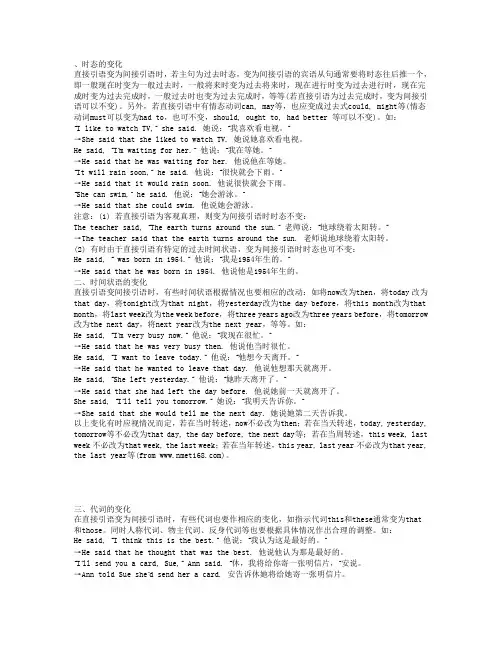
、时态的变化直接引语变为间接引语时,若主句为过去时态,变为间接引语的宾语从句通常要将时态往后推一个,即一般现在时变为一般过去时,一般将来时变为过去将来时,现在进行时变为过去进行时,现在完成时变为过去完成时,一般过去时也变为过去完成时,等等(若直接引语为过去完成时,变为间接引语可以不变)。
另外,若直接引语中有情态动词can, may等,也应变成过去式could, might等(情态动词must可以变为had to,也可不变,should, ought to, had better 等可以不变)。
如:“I like to watch TV,” she said. 她说:“我喜欢看电视。
”→She said that she liked to watch TV. 她说她喜欢看电视。
He said, “I’m waiting for her.”他说:“我在等她。
”→He said that he was waiting for her. 他说他在等她。
“It will rain soon,” he said. 他说:“很快就会下雨。
”→He said that it would rain soon. 他说很快就会下雨。
“She can swim,” he said. 他说:“她会游泳。
”→He said that she could swim. 他说她会游泳。
注意:(1) 若直接引语为客观真理,则变为间接引语时时态不变:The teacher said, “The earth turns around the sun.”老师说:“地球绕着太阳转。
”→The teacher said that the earth turns around the sun. 老师说地球绕着太阳转。
(2) 有时由于直接引语有特定的过去时间状语,变为间接引语时时态也可不变:He said, “ was born in 1954.”他说:“我是1954年生的。
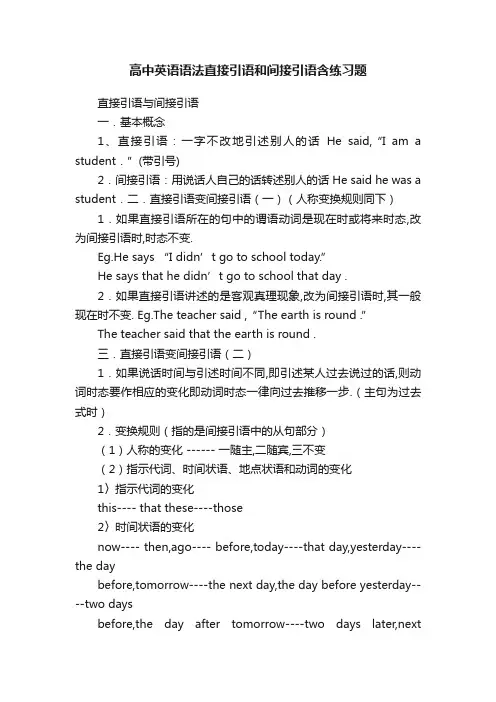
高中英语语法直接引语和间接引语含练习题直接引语与间接引语一.基本概念1、直接引语:一字不改地引述别人的话He said,“I am a student.”(带引号)2.间接引语:用说话人自己的话转述别人的话 He said he was a student.二.直接引语变间接引语(一)(人称变换规则同下)1.如果直接引语所在的句中的谓语动词是现在时或将来时态,改为间接引语时,时态不变.Eg.He says “I didn’t go to school today.”He says that he didn’t go to school that day .2.如果直接引语讲述的是客观真理现象,改为间接引语时,其一般现在时不变. Eg.The teacher said ,“The earth is round .”The teacher said that the earth is round .三.直接引语变间接引语(二)1.如果说话时间与引述时间不同,即引述某人过去说过的话,则动词时态要作相应的变化即动词时态一律向过去推移一步.(主句为过去式时)2.变换规则(指的是间接引语中的从句部分)(1)人称的变化 ------ 一随主,二随宾,三不变(2)指示代词、时间状语、地点状语和动词的变化1〉指示代词的变化this---- that these----those2〉时间状语的变化now---- then,ago---- before,today----that day,yesterday----the daybefore,tomorrow----the next day,the day before yesterday----two daysbefore,the day after tomorrow----two days later,nextweek/month,etc.---- the next week/month,/doc/2a17542514.html,stweek/month,etc.---- the week/month before3〉地点状语的变化here----there4〉动词的变化come----go(3)时态的变化1〉一般现在时-------一般过去时2〉现在进行时-------过去进行时3〉现在完成时-------过去完成时4〉一般过去时-------过去完成时5〉过去完成时-------过去完成时6〉一般将来时-------过去将来时四.变换类型1.直接引语为陈述句直接引语为陈述句,用that引导(口语中可以省略).e.g.直接引语:The teacher told the students,“I will give you a surprise.”间接引语:The teacher told the students that she would give them asurprise.2.直接引语为疑问句(1)直接引语为一般疑问句时,由whether或if引导,用陈述句的语序e.g.直接引语:He said to us,“Are you going away today?”间接引语:He asked us whether/if we were going away that day.直接引语为疑问句(2)直接引语为特殊疑问句时,其关联词用相应的疑问代词或疑问副词,其后用陈述语序e.g.直接引语:She asked,“Who will help me finish the job?”间接引语:She asked who would help her finish the job.e.g.直接引语:He asked,“What have you done?”间接引语:He asked what I had done.直接引语为疑问句(3)直接引语为选择疑问句,变为间接引语时应用whether…or…e.g.直接引语:“Do you like tea or coffee?” she asked me.间接引语:She asked me whether I liked tea or coffee.3.直接引语为祈使句直接引语为祈使句,变为间接引语时将祈使句的动词原形变为带to 的不定式.它的否定是在to前加not.它没有时态的变化.其他的变化和直接引语是陈述句的情况相同.e.g.直接引语:I said to her,“Please give me a glass of wa ter.”间接引语:I asked her to give me a glass of water.直接引语:He said,“Don’t make so much noise,boys.”间接引语:He told the boys not to make so much noise.4.直接引语为感叹句直接引语若是感叹句,变为间接引语时多采用宾语从句结构,即可用what或how 引导,也可用that引导e.g.直接引语:“What a clever boy you are!”,my teacher said to him.间接引语:My teacher told him what a clever boy he was.My teacher told him that he was a very clever boy.英语小题集练——直接引语和间接引语1、— Could you tell me ______?—Yes. It’s next to the supermarket.A.where the post office isB.where was the post officeC.where is the post officeD.where the post office was2、My brother said, “I’m watching TV now.”My brother said watching TV .A.he, was, now B.I, was, thenC.I, am, that day D.he, was, then3、—Do you know____________?—It’s about ten minutes’ walk.A.how many minutes do you walk to the nearest hospital B.which is the way to the nearest hospitalC.how long did you reach the nearest hospitalD.how far it is to the nearest hospital from here4、-- Do you know ________ the new computer yesterday? -- Sorry, I have no idea.A.how much did she pay for B.how much will she pay for C.how much she paid for D.how much she will pay for5、Jenny is on holiday now. I wonder ________.A.when she will come back B.when she came backC.when will she come back D.when did she come back6、Would you please tell me ______ this book?A.where you bought B.where did you buyC.where you buy D.where do you buy7、— Could you tell me_____ ?— About half an hour.A.how long it takes to walk to the Science and Technology Museum from schoolB.how long it took to walk to the Science and Technology Museum from schoolC.how far was it to walk to the Science and TechnologyMuseum from schoolD.how far it was to walk to the Science and Technology Museum from school.8、I ______ that he’s a hardw orking teacherA.never doubt B.always doubt C.seldom ask D.often wonder答案1、2、3、4、5、6、7、8、直接引语和间接引语专项练习一、把下列的句子变成间接引语:1. “I’m leaving for London next week.” My sister said to me.2. John said, “Mr. Smith has come here.”3. She said, “Do you want me to help you?”4. “Does the man in the shop find his wallet at last?” She said.5. Mum said to the newcomer, “Can you speak English?”6. “How many people are there in your family?” He asked the boy.7. He said to me, “I have left my book in your room.”8. Kitty said “I’ll call again after supper this evening.”9. S he said, “I will come here again tonight.”10. He said, “I arrived yesterday morning.”11. She said , “My sister will be back tomorrow morning.”12. “Who lives next door?” she asked.13. He said , “I have lost my umbrella.”14. Paul said, “I’m trying to get a taxi.”15. “Frank, I came to return you the book,” Henry said.16. He asked me, “Are you a teacher or a student?”二、把下列句子变成直接引语:23. Father asked me who had broken the window.24. She asked me which one I liked the best.25. He asked whether I had watched TV the night before.26. Jim asked me if I was busy that day.27. Pick said that he would take Mary there the next time.三、扩展练习:宾语从句。
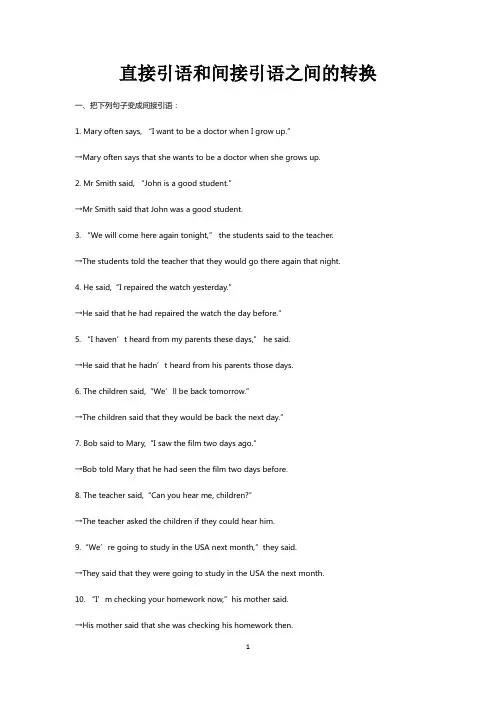
直接引语和间接引语之间的转换一、把下列句子变成间接引语:1. Mary often says, “I want to be a doctor when I grow up.”→Mary often says that she wants to be a doctor when she grows up.2. Mr Smith said, “John is a good student.”→Mr Smith said that John was a good student.3. “We will come here again tonight,” the students said to the teacher.→The students told the teacher that they would go there again that night.4. He said,“I repaired the watch yesterday.”→He said that he had repaired the watch the day before.”5. “I haven’t heard from my parents these days,” he said.→He said that he hadn’t heard from his parents those days.6. The children said,“We’ll be back tomorrow.”→The children said that they would be back the next day.”7. Bob said to Mary,“I saw the film two days ago.”→Bob told Mary that he had seen the film two days before.8. The teacher said,“Can you hear me, children?”→The teacher asked the children if they could hear him.9.“We’re going to study in the USA next month,”they said.→They said that they were going to study in the USA the next month.10. “I’m checking your homework now,”his mother said.→His mother said that she was checking his homework then.11. “The earth goes around the sun,” the teacher said.→The teacher said (that) the earth goes around the sun.12.“I can finish it in half an hour,” the worker said to me.→The worker told me he could finish it in half an hour.13.“Will you go to the station with me to meet a friend of mine this afternoon?” he asked me.→He asked me if I would go to the station with him to meet a friend of his that afternoon.14.“Do you remember what your uncle told you last night?” Li Ping’s father asked him.→Li Ping’s father asked him if he remembered what his uncle told him the night before.15.“Why did she refuse to go there?” the teacher asked.→The teacher asked why she had refused to go there.16.“Please wait for me at the gate of the Summer Palace at two tomorrow afternoon,” Kate said to her friend.→Kate asked her friend to wait for her at the gate of the Summer Palace at two the next afternoon.17.“Are you feeling better today?” the doctor asked my sister.→The doctor asked my sister if she was feeling better that day.18. He said to me,“Where did you go last week?”→He asked me where had I had gone the week before.19. He said,“I joined the English Club in 2007.”→He said that he joined the English Club in 2007.20. John said to me,“Where will you go this Sunday?”→John asked me where I would go that Sunday.21.She said,“I will come this evening.”→She said that she would go that evening.22.“Had you finished your homework before you watched TV?” Kate’s mother asked her.→Kate’s mother asked her if she had finished her homework before she watched TV.二、把下列句子变成直接引语:1. He said he knew nothing about Tom.→He said,“I know nothing about Tom.”2. Tom asked Mary if she would watch his CD-ROMs that day.→Tom said to Mary,“Will you watch my CD-ROMs today?”3. Tom’s mother asked him why he has made so many mistakes in his homework that time.→Tom’s mother said to him,“Why have you made so many mistakes in your homework this time?”→Tom’s mother asked,“T om, Why have you made so many mistakes in your homework this time?”4. They said they had studied English for three years.→They said,“We have studied English for three years.”5. He told me there would be a basketball match that afternoon.→He said to me,“There will be a basketball match this afternoon.”6. Uncle Wang asked me where my father had been and what he had been doing all those days. →Uncle Wang asked me,“Where has your father been and what has he been doing all these days?”7. He said he had seen the film that day.→He said,“I saw the film yesterday.”8. He said he had finished the work that day.→He said,“I have finished the work today.”9. He told his little son to go inside and not come out until the rain had stopped.→He told his little son,“Go inside and don’t come out until the rain has stopped.”10. The conductor asked Zhang Hong where she was going to get off.→The conductor said to Zhang Hong,“Where are you going to get off ?”11. He asked whether they would go with him.→He asked,“Will you go with me?”12. Mr White asked me to give his wife a message when she returned from the library.→Mr White said to me,“Please give my wife a message when she returns from the library.”13. A asked the teacher whether Gauss was born in 1777.→A asked the teacher,“Was Gauss born in 1777?”14. The old worker told us not to forget the past.→The old worker sad to us,“Don’t forget the past.”15. He asked me Why Eidson’s teacher said that he wasn’t bright and wasn’t worth teaching. →He asked me,“Why did Eidson’s teacher said that he wasn’t bright and wasn’t worth teaching?”16. He asked me what else I wanted him to do.→He asked me,“what else do you want me to do?”17. She asked Xiao Wang if that kind of telephone was made in Guangzhou.→She asked Xiao Wang,“Is this kind telephone made in Guangzhou? ”18. He asked me how many times I had been to my home town since 2000.→He asked me,“How many times have you been to your home town since 2000?”19. I asked one of the boys if there were any mistakes in his homework.→I asked one of the boys,“Are there any mistakes in your homework?”20. She told me she had seen a letter on my desk the day before.→“I saw a letter on your desk yesterday,”she said to me. 21. The guard said that he would not let him in if he had no pass. →The guard said,“I will not let you in if you have no pass.”。
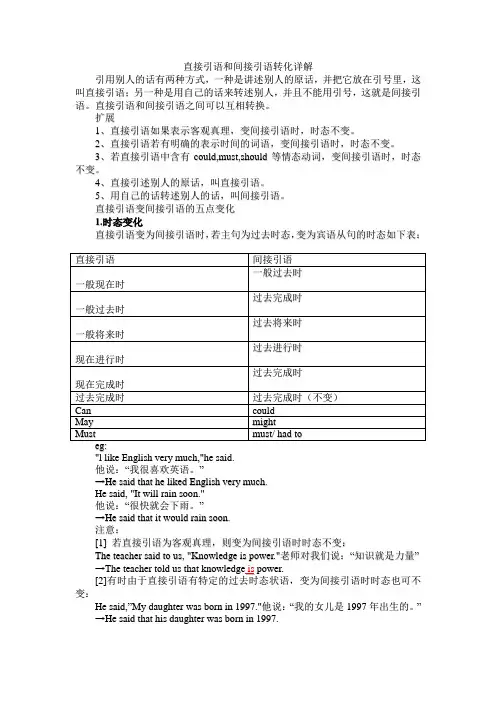
直接引语和间接引语转化详解引用别人的话有两种方式,一种是讲述别人的原话,并把它放在引号里,这叫直接引语;另一种是用自己的话来转述别人,并且不能用引号,这就是间接引语。
直接引语和间接引语之间可以互相转换。
扩展1、直接引语如果表示客观真理,变间接引语时,时态不变。
2、直接引语若有明确的表示时间的词语,变间接引语时,时态不变。
3、若直接引语中含有c o u l d,m u s t,s h o u l d等情态动词,变间接引语时,时态不变。
4、直接引述别人的原话,叫直接引语。
5、用自己的话转述别人的话,叫间接引语。
直接引语变间接引语的五点变化1.时态变化直接引语变为间接引语时,若主句为过去时态,变为宾语从句的时态如下表:"l l i k e E n g l i s h v e r y m u c h,"h e s a i d.他说:“我很喜欢英语。
”→H e s a i d t h a t h e l i k e d E n g l i s h v e r y m u c h.H e s a i d,"I t w i l l r a i n s o o n."他说:“很快就会下雨。
”→H e s a i d t h a t i t w o u l d r a i n s o o n.注意:[1]若直接引语为客观真理,则变为间接引语时时态不变:T h e t e a c h e r s a i d t o u s,"K n o w l e d g e i s p o w e r."老师对我们说:“知识就是力量”→T h e t e a c h e r t o l d u s t h a t k n o w l e d g e i s p o w e r.[2]有时由于直接引语有特定的过去时态状语,变为间接引语时时态也可不变:H e s a i d,”M y d a u g h t e r w a s b o r n i n1997."他说:“我的女儿是1997年出生的。
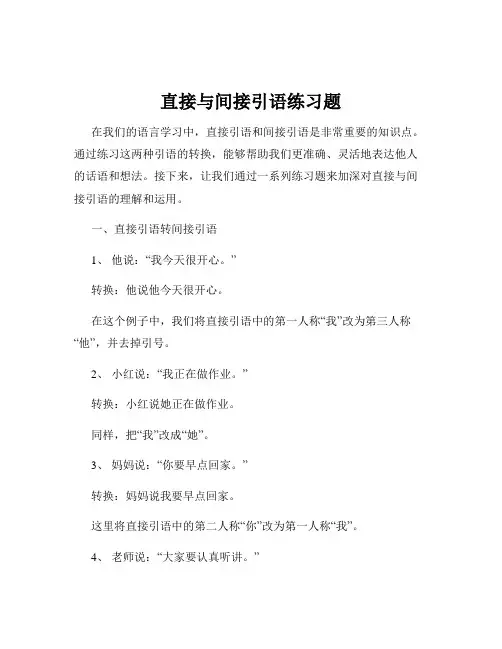
直接与间接引语练习题在我们的语言学习中,直接引语和间接引语是非常重要的知识点。
通过练习这两种引语的转换,能够帮助我们更准确、灵活地表达他人的话语和想法。
接下来,让我们通过一系列练习题来加深对直接与间接引语的理解和运用。
一、直接引语转间接引语1、他说:“我今天很开心。
”转换:他说他今天很开心。
在这个例子中,我们将直接引语中的第一人称“我”改为第三人称“他”,并去掉引号。
2、小红说:“我正在做作业。
”转换:小红说她正在做作业。
同样,把“我”改成“她”。
3、妈妈说:“你要早点回家。
”转换:妈妈说我要早点回家。
这里将直接引语中的第二人称“你”改为第一人称“我”。
4、老师说:“大家要认真听讲。
”转换:老师说大家要认真听讲。
当直接引语中的对象是“大家”时,在间接引语中保持不变。
5、小明说:“我的书包在桌子上。
”转换:小明说他的书包在桌子上。
注意人称和指示代词的变化。
二、间接引语转直接引语1、他告诉我他明天会来。
转换:他说:“我明天会来。
”2、她跟我说她喜欢唱歌。
转换:她说:“我喜欢唱歌。
”3、妈妈说我应该多吃水果。
转换:妈妈说:“你应该多吃水果。
”将间接引语中的人称和指示代词改回原来的形式,并加上引号。
三、复杂情况的转换1、他说:“我昨天去了北京,那里很美。
”转换:他说他昨天去了北京,那里很美。
2、小红说:“我明天打算去看电影,如果不下雨的话。
”转换:小红说她明天打算去看电影,如果不下雨的话。
3、老师说:“你们要努力学习,因为考试快到了。
”转换:老师说我们要努力学习,因为考试快到了。
在这些复杂的句子中,我们依然遵循人称和指示代词的变化原则。
四、时态的变化1、他说:“我现在正在吃饭。
”转换:他说他那时正在吃饭。
直接引语是现在进行时,在间接引语中要变成过去进行时。
2、她说:“我昨天买了一本书。
”转换:她说她昨天买了一本书。
一般过去时在直接引语和间接引语中保持不变。
3、小明说:“我明天要去旅行。
”转换:小明说他第二天要去旅行。
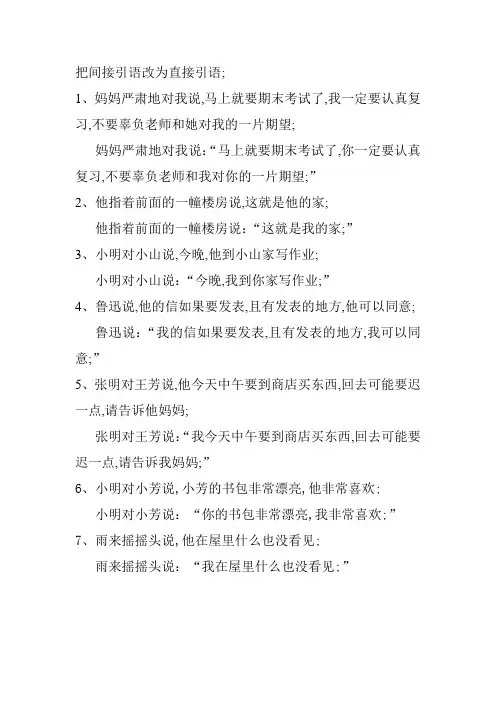
把间接引语改为直接引语;
1、妈妈严肃地对我说,马上就要期末考试了,我一定要认真复习,不要辜负老师和她对我的一片期望;
妈妈严肃地对我说:“马上就要期末考试了,你一定要认真复习,不要辜负老师和我对你的一片期望;”
2、他指着前面的一幢楼房说,这就是他的家;
他指着前面的一幢楼房说:“这就是我的家;”
3、小明对小山说,今晚,他到小山家写作业;
小明对小山说:“今晚,我到你家写作业;”
4、鲁迅说,他的信如果要发表,且有发表的地方,他可以同意;
鲁迅说:“我的信如果要发表,且有发表的地方,我可以同意;”
5、张明对王芳说,他今天中午要到商店买东西,回去可能要迟一点,请告诉他妈妈;
张明对王芳说:“我今天中午要到商店买东西,回去可能要迟一点,请告诉我妈妈;”
6、小明对小芳说,小芳的书包非常漂亮,他非常喜欢;
小明对小芳说:“你的书包非常漂亮,我非常喜欢;”7、雨来摇摇头说,他在屋里什么也没看见;
雨来摇摇头说:“我在屋里什么也没看见;”。
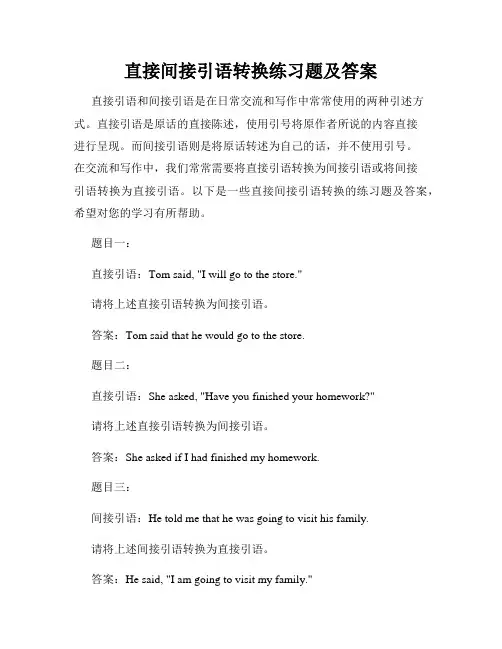
直接间接引语转换练习题及答案直接引语和间接引语是在日常交流和写作中常常使用的两种引述方式。
直接引语是原话的直接陈述,使用引号将原作者所说的内容直接进行呈现。
而间接引语则是将原话转述为自己的话,并不使用引号。
在交流和写作中,我们常常需要将直接引语转换为间接引语或将间接引语转换为直接引语。
以下是一些直接间接引语转换的练习题及答案,希望对您的学习有所帮助。
题目一:直接引语:Tom said, "I will go to the store."请将上述直接引语转换为间接引语。
答案:Tom said that he would go to the store.题目二:直接引语:She asked, "Have you finished your homework?"请将上述直接引语转换为间接引语。
答案:She asked if I had finished my homework.题目三:间接引语:He told me that he was going to visit his family.请将上述间接引语转换为直接引语。
答案:He said, "I am going to visit my family."题目四:间接引语:The teacher said that the test would be difficult.请将上述间接引语转换为直接引语。
答案:The teacher said, "The test will be difficult."题目五:直接引语:She said, "I can't come to the party tonight."请将上述直接引语转换为间接引语。
答案:She said that she couldn't come to the party tonight.题目六:直接引语:He asked, "Did you see the movie last night?"请将上述直接引语转换为间接引语。
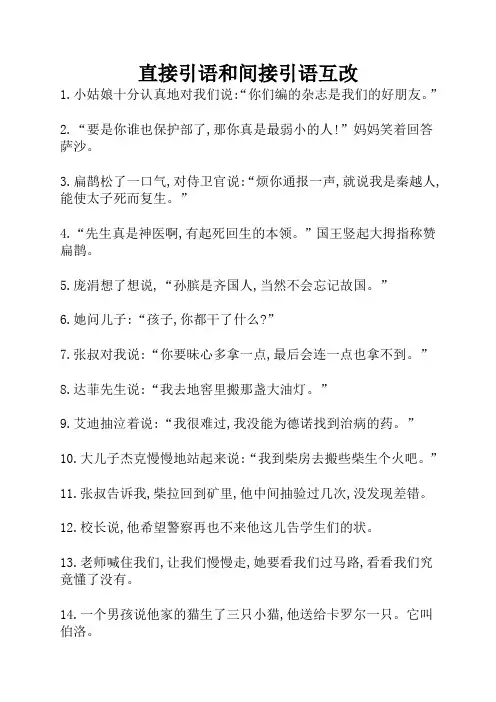
直接引语和间接引语互改1.小姑娘十分认真地对我们说:“你们编的杂志是我们的好朋友。
”2.“要是你谁也保护部了,那你真是最弱小的人!”妈妈笑着回答萨沙。
3.扁鹊松了一口气,对侍卫官说:“烦你通报一声,就说我是秦越人,能使太子死而复生。
”4.“先生真是神医啊,有起死回生的本领。
”国王竖起大拇指称赞扁鹊。
5.庞涓想了想说,“孙膑是齐国人,当然不会忘记故国。
”6.她问儿子:“孩子,你都干了什么?”7.张叔对我说:“你要昧心多拿一点,最后会连一点也拿不到。
”8.达菲先生说:“我去地窖里搬那盏大油灯。
”9.艾迪抽泣着说:“我很难过,我没能为德诺找到治病的药。
”10.大儿子杰克慢慢地站起来说:“我到柴房去搬些柴生个火吧。
”11.张叔告诉我,柴拉回到矿里,他中间抽验过几次,没发现差错。
12.校长说,他希望警察再也不来他这儿告学生们的状。
13.老师喊住我们,让我们慢慢走,她要看我们过马路,看看我们究竟懂了没有。
14.一个男孩说他家的猫生了三只小猫,他送给卡罗尔一只。
它叫伯洛。
15.罗达骄傲地告诉伙伴们,他的哥哥参加志愿军到西班牙去了。
16.欧立希坚定地表示,他们必须用神奇的子弹去消灭那些小病菌。
17.我和同伴紧张地告诉向导,让他想想办法。
18.我终于忍不住了,让妈妈给我买包山楂片。
19.焦裕禄安详地告诉大家,他只有一个要求,要求组织上把他运回兰考,埋在沙丘上。
20.杰克逊大叔微笑地注视着一个年轻人,告诉他,自己的庄园需哟人手,如果年轻人愿意留下来的话,他太高兴了。
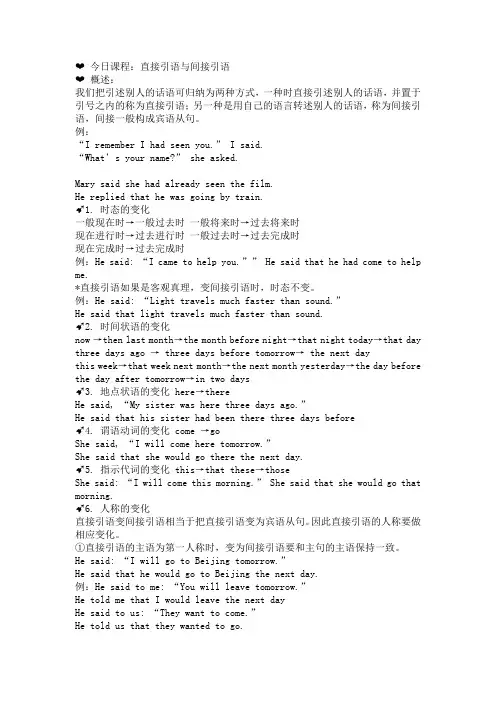
❤今日课程:直接引语与间接引语❤概述:我们把引述别人的话语可归纳为两种方式,一种时直接引述别人的话语,并置于引号之内的称为直接引语;另一种是用自己的语言转述别人的话语,称为间接引语,间接一般构成宾语从句。
例:“I remember I had seen you.” I said.“What’s your name?” she asked.Mary said she had already seen the film.He replied that he was going by train.➹1. 时态的变化一般现在时→一般过去时一般将来时→过去将来时现在进行时→过去进行时一般过去时→过去完成时现在完成时→过去完成时例:He said: “I came to help you.”” He said that he had come to help me.*直接引语如果是客观真理,变间接引语时,时态不变。
例:He said: “Light travels much faster than sound.”He said that light travels much faster than sound.➹2. 时间状语的变化now →then last month→the month before night→that night today→that day three days ago → three days before tomorrow→ the next daythis week→that week next month→the next month yesterday→the day before the day after t omorrow→in two days➹3. 地点状语的变化here→thereHe said, “My sister was here three days ago.”He said that his sister had been there three days before➹4. 谓语动词的变化come →goShe said, “I will come here tomorrow.”She said that she would go there the next day.➹5. 指示代词的变化this→that these→thoseShe said: “I will come this morning.” She said that she would go that morning.➹6. 人称的变化直接引语变间接引语相当于把直接引语变为宾语从句。
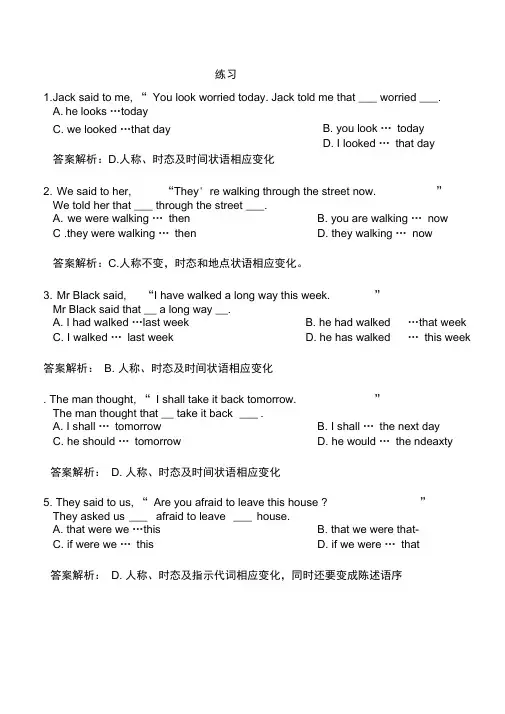
练习1. J ack said to me, “ You look worried today. Jack told me that ___ worried ___.A. he looks …todayC. we looked …that day答案解析:D.人称、时态及时间状语相应变化2. We said to her, “They ' re walking through the street now. ” We told her that ___ through the street ___.A. we were walking … thenB. you are walking … nowC .they were walking … then D. they walking … now答案解析:C.人称不变,时态和地点状语相应变化。
3. Mr Black said, “I have walked a long way this week. ”Mr Black said that __ a long way __.A. I had walked …last weekB. he had walked…that week C. I walked … last week D. he has walked… this week答案解析: B. 人称、时态及时间状语相应变化. The man thought, “ I shall take it back tomorrow.” The man thought that __ take it back ___ .A. I shall … tomorrowB. I shall … the next dayC. he should … tomorrowD. he would … the ndeaxty 答案解析: D. 人称、时态及时间状语相应变化5. They said to us, “ Are you afraid to leave this house ? ”They asked us ___ afraid to leave ___ house.A. that were we …thisB. that we were that-C. if were we … thisD. if we were … that答案解析: D. 人称、时态及指示代词相应变化,同时还要变成陈述语序B. you look … today D. I looked … that day练习二1. Jane said, “What did he hear about a week ago? ”Jane asked ___ about ____ .A. that he heard …a wgek aB. what he had heard …the week beforeC. what he had herd …a week agoD. if he heard …the week ago答案解析: B. 人称、时态及时间状语相应变化,同时还要变成陈述语序。
直接引语和间接引语转换练习题(附答案)第一部分:将直接引语转换为间接引语
1. "我会去看电影" 她说。
答案:她说她会去看电影。
2. "我们应该尽快出发," 他们告诉我。
答案:他们告诉我他们应该尽快出发。
3. "我已经完成了工作," 她说。
答案:她说她已经完成了工作。
4. "我们很快就会回来," 他们保证道。
答案:他们保证很快就会回来。
5. "我非常爱那部电影," 她说。
答案:她说她非常爱那部电影。
第二部分:将间接引语转换为直接引语
1. 父亲说他晚上没时间看电视。
答案:"我晚上没时间看电视",父亲说。
2. 她告诉我她正在与朋友聊天。
答案: "我正在与朋友聊天," 她告诉我。
3. 他告诉我今晚他不会加班。
答案:"今晚我不会加班," 他告诉我。
4. 她说她已经吃了晚饭。
答案: "我已经吃了晚饭," 她说。
5. 他告诉我他明天会去纽约。
答案: "明天我会去纽约," 他告诉我。
结论
正确的直接引语和间接引语的使用可以使我们的文本更加简洁、易于理解。
有时候我们需要将别人说或写的话转化为自己的语言风格,因此掌握这些技能很重要。
直接引语变间接引语这两种引语都是宾语从句,但是直接引语放在引号内,不用连词联接;间接引语不用引号,通常用连接词与主句联接一、直接引语变间接引语时句式的变化例:Hesaid, “rmveryglad. ”f Hesaidhewasveryglad.例:Hesaid, “CanyoucomethisafternoonJohn ”f HeaskedJoh ncouldcomethatafter noon.例:Hesaid, “”f.Tomsaystome,whatfooddoyoulikebest . ”f TomasksmefoodIlikebestOurpare ntstoldus “ LearnE nglishw我们的父母告诉我们:把英语学好啊!”Ourpare ntstoldusE nglishwel I我们的父母告诉我吗要把英语学好。
Theteachersaidtome, “ Don' treadthatnovel! ”Theteacherasked/toldmethat no vel.Ourpare ntstoldus, “ Neverdowr父母!告‘诉我们:不要做错事!”Ourpare ntstoldus nevertodowro ng我们的父母告诉我们不要做错事。
二、人称的变化例如:“wenttotheGreatWallyesterday,LiHua said.f LiHuasaidthathehadg on etotheGreatWallthedaybefore.“ llcometohelpyouwheneveryouneedmyhelp ” hanswerecher. f Hean sweredherthOtewouldcometohelpherwhe nevershe neededhishelp.Shesaidtome, Yourpronunciationisbetterthanhis.”f Shetoldmethatmypro nun ciatio nwasbettertha nhis.三、时态变化主句的谓语动词是一般过去时, 从句的谓语动词在时态方面要做相应的变化, 推一个时态四、指示代词、时间状语、地点状语和动词的变化【拓展延伸】直接引语变为间接引语时时态不作改变的情况Hesays, “I ' mtired. ”f Hesaysthatheistired.Hewillsay, “ Theboywaslazy. ”f Hewilltellyouthattheboywaslazy.Ourgeographyteachersaidtous, “ Theearthgoesro un dthes un.f Ourgeographyteachertoldusthattheearthgoesro un dthes un.Shesaid, “ Iwasbio1995.”f Shesaidthatshewasbor nin 1995.【典型例题】(1)Canyoutellme ______(2) _____________________________ Thephysicsteachersaidtheearth aroundthesun. 【语法专练】附:Unitl短语归纳1. 做个好朋友tobeagoodfriend2. 做下列调查makethefollowingsurvey3. 合计总分addupthescore4. 得分getpoints5. 心烦意乱地来到学校cometoschoolupset6. 不理睬铃声ignorethebell7. 使你那个德国朋友平静下来calmdow nyourGerma nfrie nd8. 关心你朋友beconcernedaboutyourfriend(s)9. 松开了getloose10. 不得不去户外遛狗havegottowalkthedogoutdoors11 .帮他期末考试作弊helphimcheat in thee nd-of-termexam12. 列出理由makealistofreasons/listthereasons13. 记下一连串的请求setdownaseriesofrequests14. 根据问卷调查accordingtothequestionnaire15. 根据编辑的忠告accord in gtotheeditor ' sadvice16. 为了分担你的困难inordertoshareyourdifficulties/troubles17. 与老板相爱fallinlovewiththeboss18. 与我的同桌相处融洽getalong/onwellwithmydeskmate19. 关心青少年beconcernedaboutteenagers20. 为了和老板面对面地交流ino rdertocom muni catewiththebossfacetoface21. 信任政府trust/believeinthegovernment22. 经历了太多的战争gothroughtoomanywars23. 相邻的城镇neighboringtowns24. 相邻的国家neighboringcountries直接引语变间接引语练习题一、将所给直接引语变为间接引语,每空一词:1. “Inevereatmeat. ” hesaid.Hesaidthat _____ never ______ m eat.2. “ I ' vefoundmywallet. ” hesaidtome.He _____ m ethathe _________________ wallet.3. “ Itookithomewithme. ” shesaid.Shesaidthat __________________ ithomewithher.,“ Thes un rises in theeasta ndgoesdow nin thewest. ”Theteachersaidthatthesun _____ intheeastand _____ dow nin thewest.5. “ Imetheryesterday. ” hesaidtome.He _____ m ethathe _____ mettheday _____ .6. “Youmustcomeherebeforefive. ” hesaid.HesaidthatI _____ togo _____ b eforefive.7. “Iboughtthehouse10yearsago. ” hesaid.Hesaidthathe ______ boughtthehouse10years ______ .8. “Didyouseeherlastweek ” hesaid.He __________ Ihadseenhertheweek ______ .,“YoucansithereJim. ”He _____ J imthathe _____ sitthere.,“ Howdidyoufindit,mother ” Heaskedhermother fo un dit.11. “Wherehaveyoubeenthesedays” heasked.Heaskedme ___________________ been _______ days.12. “Doyouknowwhereshelives ” heasked.Heasked __________ knewwhereshe _____ .13. “Stopmakingsomuchnoise,children. ” hesaid.He _____ t hechildren ___________ makin gsomuch no ise.14. “Don ttellhimthenews. ” shesaid.Shetoldme _________________ himthe news.15. “lamhavingsupper, ” hesaid.Hesaidthat _____________ h av in gsupper.16. “I ' veseenthefilm, ” Ginasaidtome.Gina ______ methatshe _____________ t hefilm.17. “ Iwenthomewithmysister, ” shesaid.Shesaidthat ____________________ homewithhersister.18. “Keepquiet,children. ” hesaid.He ______ t hechildren ______________ q uiet.20. “Don tlookoutofthewindow, ” shesaid.Shetoldme ____________________ outofthewi ndow.家庭作业1. “Iamhavingsupper, ” hesaid.Hesaidthat _____________ h av in gsupper.2. “ I ' veseenthefilm, ” Ginasaidtome.Gina ______ m ethatshe ______________ t hefilm.3. “Iwenthomewithmysister, ” shesaid.Shesaidthat ____________________ homewithhersister.,“Thesunisbiggerthanthemoon. ”Theteachersaidthatthesun _____ biggertha nthem oon.5. “ Imetheryesterday, ” hesaidtome.Hetoldmethathe ______ methertheday ______ .6. “Youmustcomeherebeforefive, ” hesaid.HesaidthatI ______ togo ______ beforefive.7. “Iboughtthecomputertwoweeksago, ” shesaid.Shesaidthatshe ______ boughtthecomputertwoweeks ______ 8. “Didyoureadthebooklastweek ” hesaid.He ____________ Ihadreadthebooktheweek ______ .,“YoucansithereJim. ”He ______ J imthathe _______ sitthere,“ Howdidyoufindit,mother ” Heaskedhermother fo un dit. 11. “Wherehaveyoubeenthesedays” heasked.Heaskedme ____________________ been _____ days.12 “Doyouknowwhereshelives ” heaskedme.Heaskedme _____________ knewwhereshe ______ .13. “Keepquiet,children. ” hesaid.He ______ t hechildren _____________ quiet.14. “Don tlookoutofthewindow, ” shesaid.Shetoldme ____________________ outofthewi ndow.15. “Areyouinterestedinthis ” hesaidtome.Heasked _____________ Iwasinterestedin ______ .。
直接引语与间接引语相互转换地方法指导及练习题方育龙方法:“直接引语变间接引语”这种题型在小学中、高年级语文试卷中常常出现,有一定地难度,很多学生容易出错.其实,直接引语是直接引用别人地话,而间接引语则是转达别人说地话.“直接引语变间接引语”就是要求把别人说地原话进行转述.答题时,只要注意以下几个方面,便不会出问题了.一、只改变引语部分,提示语不变;例如:妈妈说:“我今天加班.”需要改变地只是:“我今天加班.”这一部分.二、标点符号要作相应改变,即把冒号、前引号(:“)变成逗号(,),后引号(”)删除;三、引语中,人称要变成相应地指代者:说话人即第一人称“我” 、“我们”要改为第三人称“他”、“她”或“他们”;例如:妈妈说:“我今天加班.”其中“我”指代地是妈妈.所以,要变成“她”.改后为:妈妈说,她今天加班.当转述内容涉及其他人称时也要发生相应变化.如:姐姐对我说:“你说得对,我就这样做.”改:姐姐告诉我,我说得对,她就这样做.上面地例句中涉及了第二人称,在改为转述句时就应改为第一人称.四、有称呼语地,称呼语要去掉;例如:老红军说:“小鬼,你骑上我地马吧!”其中,“小鬼”要删除.变后为:老红军说,小鬼骑上他地马吧!五、引语是疑问句地,要变成陈述地语气.例如:明明问我:“今天放学后,到我家写作业,行吗?”变后为:明明问我,今天放学后,到他家写作业,行不行.六、间接引语改为直接引语地方法正好相反,上面地五点都适用,如第三人称“他”或“她”应改为第一人称“我”,说话内容涉及第一人称应改为第二人称.如:. 小华对小强说,他明天把钢笔还给小强.小华对小强说:“我明天把钢笔还给你.”. 妹妹告诉爸爸,哥哥说他晚上有事不回来吃饭了.妹妹对爸爸说:“哥哥让我转告你,它晚上有事不回来吃饭了.”. 老师对小丽说,她地表现最出色.老师对小丽说:“你地表现最出色.”.老班长告诉我们,他没有完成任务,没把我们照顾好.改:老班长对我们说:“我没有完成任务,没把你们照顾好.”练习题一:把直接引语变成间接引语..老师对我说:“我教你毛笔字地写法.”.梅花兴奋地说:“我是中国人,我怎么能忘掉祖国地语言呢?”.他站起来对大家说:“孩子们,我要去开会了.你们要听话.”.奶奶问我:“今天我还给你送饭吗?”.妈妈说:“小明,今晚我加班,你自己做饭吃!”.诸葛亮对鲁肃说:“你借给我二十条船,我自有妙用.”.小红军对陈赓说:“将军,我还要等我地同伴呢!”.妈妈气喘吁吁地说:“我今晚有急事,你去姥姥家.”.江姐回答说:“上级地姓名地址,我知道,下级地姓名地址,我也知道.”.小明和小红在一起写作业,小明对小红说:“你能教我怎样写作文吗?”.父亲坚决地对母亲说:“不是常对你说吗?我是不能轻易离开北京地.你要知道现在是什么时候,这里地工作多么重要.我哪能离开呢?”.妈妈对小红说:“你这么小,一个人出门我不放心?”.鲁肃对诸葛亮说:“都是你自己找地,我怎么帮得了你地忙?”.“周瑜长叹一声,说:“诸葛亮神机妙算,我真比不上他!”.刘明问小华:"你什么时候还我那本《故事会》?”.老班长说:“我快不行了.小梁,你要坚强些,带领两个小战士走出草地.”.李勤沮丧地对我说:"我地钢笔丢了,你能借我一支吗?”.他凑到我耳边轻轻地问:“记者,你见过电灯吗?”练习题二:. 小红军对陈赓说:“我还要等我地同伴呢.”. 老师对我说:“我教你怎么写.”. 雨来摇摇头说:“我在屋里什么也没看见.”. 李楠小声告诉我:“我家在少年宫附近.”. 小姑娘说:“我要去北京,我要去看看北京地名胜古迹.”. 老师对王芳说:“学校让你明天出席区小学生座谈会.”. 罗蒙诺索夫摇摇头对爸爸说:“我也要一本书!”. 雷锋对大嫂说:“我送你一程吧!”. 小鸟对青蛙说:“朋友,不信请你跳出井口看一看!”. 有一家外国报纸轻蔑地说:“能在南口以北修筑铁路地中国工程师还没有出世呢!”. 老师说:“你今天放学之前必须完成作业.”. 有句俗话说:“磨刀不误砍柴工.”. 楚王瞅了他一眼,冷笑一声,说:“难道齐国没有人了吗?”. 他惊讶地说:“原来是你!”. 妈妈对我说:“你今天晚上不能看电视.”. 爸爸说:“今天晚上你和妈妈先吃饭,我有事.”. 一个同学对我说:“借我一只笔.”. 外婆问我:“你在干什么?”. 老师解释说:“梦里飞行,说明你们是在长身体呀.”. 老汉从队伍里揪出一个小伙子,吼道:“你还是个党员吗?”. 小伙子推了老汉一把说:“你先走.”. 王强说:“老师,是我不对,您批评我吧!”. 我看祖父还在笑,就说:“你不信,我到屋里拿来给你看.”. 大孩子说:“爸爸,你看那树多高.”. 爸爸说:“我星期天去旅游.”. 外公说:“这是向天椒,特别辣.”. 我说:“我这个老班长下岗了.”. 爸爸感冒了,他说:“明天我要去医院看病.”. 他说:“我明天去电影院看电影.”. 房东太太说:“我地儿子今天回家,从学校回来,我高兴得不得了……但我地儿子一直没有回来.”练习题一答案:. 老师对我说,他(老师)教我毛笔字地写法..梅花兴奋地说,她是中国人,她怎么能忘掉祖国地语言呢..他站起来对大家说,他要去开会了.大家(孩子们)要听话..奶奶问我,今天她(奶奶)还给我送饭吗..妈妈说,今晚她加班, 小明自己做饭吃..诸葛亮对鲁肃说,鲁肃借给他(诸葛亮)二十条船,他(诸葛亮)自有妙用. .小红军对陈赓说,小红军还要等小红军地同伴呢..妈妈气喘吁吁地说,她今晚有急事,我去姥姥家..江姐回答说,上级地姓名地址,她知道,下级地姓名地址,她也知道..小明和小红在一起写作业,小明对小红说,小红能教他(小明)怎样写作文吗. .父亲坚决地对母亲说,不是常对母亲说吗,(.)父亲是不能轻易离开北京地.母亲要知道现在是什么时候,这里地工作多么重要.父亲哪能离开呢..妈妈对小红说,小红这么小,一个人出门她(妈妈)不放心..鲁肃对诸葛亮说,都是诸葛亮自己找地,他(鲁肃)怎么帮得了诸葛亮地忙. .周瑜长叹一声,说,诸葛亮神机妙算,他(周瑜)真比不上诸葛亮..刘明问小华,小华什么时候还他(刘明)那本《故事会》..老班长说,他快不行了.小梁要坚强些,带领两个小战士走出草地..李勤沮丧地对我说,他地钢笔丢了,我能借他一支吗..他凑到我耳边轻轻地问,我见过电灯吗.。
直接引语(直述句)与间接引语(转述句)互换定义:1、直接引语:直接引用别人的话。
如:妈妈说:“我今天加班。
”2、间接引语:用自己的话来转述别人话,不能用引号。
如:妈妈说,她今天加班。
直接引语(直述句)改为间接引语(转述句)的方法:1、“你”变“我”,“我”变“她/他”,冒号(:)变逗号(逗号),去掉双引号(“”),句尾用句号,只改双引号里面的。
/2、2、引语是疑问句的,要变成陈述的语气。
如:明明问我:“今天放学后,到我家写作业,行吗?”改为:明明问我,今天放学后,到他家写作业,行不行。
3、有称呼语的,称呼语要去掉如:老红军说:“小鬼,你骑上我的马吧!”改为:老红军说,让我骑上他的马。
间接引语(转述句)改为直接引语(直述句)的方法:反过来即可。
练习题一:把直接引语变成间接引语。
1.老师对我说:“我教你毛笔字的写法。
”2.梅花兴奋地说:“我是中国人,我怎么能忘掉祖国的语言呢?”3.他站起来对大家说:“孩子们,我要去开会了。
你们要听话。
”4.奶奶问我:“今天我还给你送饭吗?”5.妈妈说:“小明,今晚我加班,你自己做饭吃!”6.诸葛亮对鲁肃说:“你借给我二十条船,我自有妙用。
”7.小红军对陈赓说:“将军,我还要等我的同伴呢!”8.妈妈气喘吁吁地说:“我今晚有急事,你去姥姥家。
”9.江姐回答说:“上级的姓名地址,我知道,下级的姓名地址,我也知道。
”10.小明和小红在一起写作业,小明对小红说:“你能教我怎样写作文吗?”12.妈妈对小红说:“你这么小,一个人出门我不放心?”13.鲁肃对诸葛亮说:“都是你自己找的,我怎么帮得了你的忙?”14.“周瑜长叹一声,说:“诸葛亮神机妙算,我真比不上他!”15.刘明问小华:"你什么时候还我那本《故事会》?”16.老班长说:“我快不行了。
小梁,你要坚强些,带领两个小战士走出草地。
”17.李勤沮丧地对我说:"我的钢笔丢了,你能借我一支吗?”18.他凑到我耳边轻轻地问:“记者,你见过电灯吗?”19. 小红军对陈赓说:“我还要等我的同伴呢。
中考英语直接引语与间接引语转换单选题40题1.She said, “I like apples.”A.She said that she like apples.B.She said that she liked apples.C.She said that she likes apples.答案:B。
直接引语变间接引语时,时态要相应地变化。
原句是一般现在时,变为间接引语时要变为一般过去时。
A 选项动词形式错误;C 选项时态未变。
2.He said, “I am happy.”A.He said that he am happy.B.He said that he was happy.C.He said that he is happy.答案:B。
直接引语中的am 变为间接引语时要变为was。
A 选项动词形式错误;C 选项时态未变。
3.They said, “We are students.”A.They said that they are students.B.They said that they were students.C.They said that they will be students.答案:B。
直接引语是一般现在时,变为间接引语变为一般过去时。
A 选项时态未变;C 选项时态错误。
4.She said, “I have a book.”A.She said that she have a book.C.She said that she has a book.答案:B。
直接引语中的have 变为间接引语时要变为had。
A 选项动词形式错误;C 选项时态未变。
5.He said, “I can swim.”A.He said that he can swim.B.He said that he could swim.C.He said that he will swim.答案:B。
句型变换:(直接引语、间接引语)
姓名:
一、把直接引语改写成间接引语。
1、郑洁悄悄地告诉小勇说:“这件事是我和小刚一起做的。
”
2、志愿军战士深情地说:“老妈妈,难道我们会把您忘怀吗?”
3、王飞对李林说:”请你回去时给个信给我妈,说我今天稍微迟一些回家。
”
4、王宁说:“我要像李永那样关心集体。
”
5、老师对小明说:“我看了你的作文很满意。
”
6、小军在电话中对我说:“下个月我一定到你那儿玩。
”
7、他想了想说:“我们哪里有近道,还不是和你们一条道。
”
8、贝多芬说:“不,我是来弹一首曲子给这位姑娘听的。
”
9、爸爸对我说:“今晚我要开会,你和妈妈早点吃饭,别等我。
”
10、周瑜长叹一声,说:“诸葛亮神机妙算,我真不如他。
”
11、山姆握着珊迪的手说:“我会永远照顾你的。
”
12、张林告诉我:“要是星期日下雨,我们就不去看电影。
”
13、贝多芬说:“我是来弹一首曲子给这位姑娘听的。
”
14、小红说:“今天下午学校组织到野外活动,我必须参加。
”
15、王宁说:“我要像李宁那样关心集体。
”
16、雨来摇摇头说:“我在屋里什么也没看见。
”
17、李楠小声告诉我:“我家在少年宫附近。
”
18、小姑娘说:“我要去北京,我要去看看北京的名胜古迹。
”
19、老师对王芳说:“学校让你明天出席小学生座谈会。
”
20、妈妈对我说:“你今天晚上不能看电视。
”
21、爸爸说:“今天晚上你和妈妈先吃饭,我有事。
”
22、一个同学对我说:“借我一只笔。
”
23、我看祖父还在笑,就说:“你不信,我到屋里拿来给你看。
”
25、爸爸感冒了,他说:“明天我要去医院看病。
”
26、他说:“我明天去电影院看电影。
”
27、姐姐对我说:“你说得对,我就这样做。
”
28、张童对我说:“我一定要坚持长跑锻炼。
”
29、雷锋对大嫂说:“我送你一程吧!”
30、老师解释说:“梦里飞行,说明你们是在长身体呀。
”。